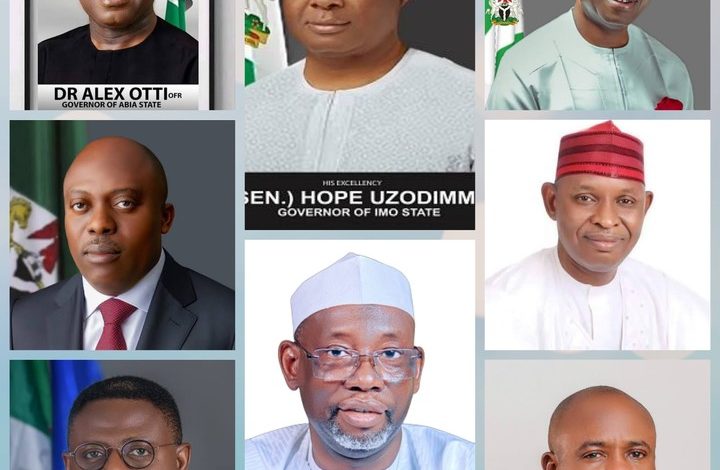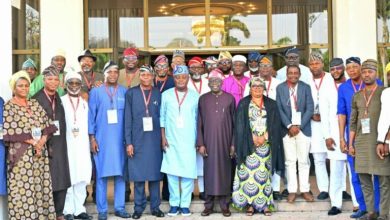S’court Verdict: Panic In States As 437 Lgs Risk Zero Allocation This Month

A panic button about the funds for the running of local governments appeared to have been pressed in no fewer than 437 local governments areas spread across 19 states of the federation, following the imminent suspension of their federal allocations as a result of last Thursday’s ruling of the Supreme Court.
The apex court, had in its ruling under the suit brought before it by the Attorney General of the Federation and Minister of Justice, Lateef Fagbemi, SAN, granted financial autonomy to the 774 local government areas (LGA) recognised by the 1999 Constitution and outlawed the penchant of state governors to institute caretaker committees or dissolve democratically elected structures in the councils.
Investigations by the Nigerian Tribune revealed that uncertainty now pervades the scenario in no fewer than 19 states of the federation which are currently running one caretaker system or the other, a development that meant that they have run foul of the ruling of the apex court, which has empowered the federal government to withhold allocations to councils without democratically elected administrations.
The Supreme Court had in a unanimous ruling of its seven-man panel, whose lead judgment was read by Justice Justice Emmanuel Agim, held that it was unconstitutional for state governments to tamper with the allocations due to the local governments, while also outlawing the operation of the caretaker system in the councils among other declarations.
The judgment ordered the federation account to henceforth pay all monies including shares from taxes and other sources meant to the councils directly to their accounts.
The court barred governors from dissolving democratically elected officials of local governments, while also declaring that it is unconstitutional for governors to tamper with council funds. The court said the 774 local government councils should be allowed to manage their funds. Aside from that, the court also barred the operation of caretaker officials in the councils. The federation account was empowered to withhold funds meant for councils that operate the caretaker system.
Attorney General of the Federation and Minister of Justice, had while commenting on the judgment of the apex court declared that the ruling takes immediate effect, an indication that councils that failed to comply will start having their funds confiscated from the next meeting of the Federation Accounts Allocation Committee(FAAC), this month.
Investigations revealed that the 437 LGAs hammer is set to fall on are in the following states: Rivers(23); Jigawa (27); Anambra (21); Zamfara (14); Benue (23); Bauchi (20); Plateau(17); Abia(17); Katsina (34); Enugu (17); Cross Rivers(18); Sokoto (23); Kano(44); Yobe (17); Ondo(18); Osun (30); Akwa-Ibom (31); Imo (27 and Kwara (16). Delta State, which held elections for its 25 local governments on Saturday might be able to escape the hammer if the democratic structure is put in place before the next FAAC meeting.
Investigations further revealed that even as the governors prepare for a meeting to fully dissect the implications of the July 11 judgment of the apex court, some government houses are already contemplating likely ways out of the possible financial squeeze.
For instance, several states which have entered into what they termed “joint projects” which tied the funds accruing to the local governments to such projects were said to be panicky as such projects may be difficult to fund henceforth.
Though the Chairman of the Nigerian Governors’ Forum and the governor of Kwara State, Alhaji Abdurahman Abdurazaq, had in an initial response declared that the Supreme Court ruling had lifted a big burden off the shoulders of the state governors, whom he said had been bailing out the local governments financially, not a few Nigerians believe that the situation has been the other way round.
However, the Chairman, of the Senate Services Committee, who is the Senator representing Kogi West Senatorial District, Senator Sunday Karimi, has said that Nigerians should expect a fightback from some state governors over the Supreme Court ruling.
Karimi stated that a key gray area in the management of the local governments is the need for the transfer of responsibility for the conduct of elections to the local councils from the various state electoral bodies to the Independent National Electoral Commission (INEC).
He said: “The battle is not yet over; some state governors will fight back. President Tinubu allowed the judiciary a free hand to operate in this particular instance, irrespective of the fact that he is but a first-term president who may desire a comeback in 2027.
“I thank Mr President for mustering the courage to do the right thing. Since 1999, the third tier of government, literally speaking, has been nonexistent. State governments treated them as appendages of the state governments.
“No president has been able to change that. But, within one year, however, President Tinubu has returned the local government to its owners—the masses. Local governments, if well-operated, will ensure a better existence for our people. President Tinubu took due cognizance of this and courageously took the bull by the horns.”
Caretaker Committee members at crossroads in states
Members of the caretaker committees set up by some state governors to run the affairs of the local governments in their domain are now at a crossroads, following last Thursday’s judgment of the Supreme Court which stopped federal allocations to local councils without democratically elected executives. The court also declared as an aberration to have a caretaker committee administer the local government, ordering the stoppage of federal allocations to states that failed to conform to the constitutional provision that elected chairmen and councilors must run the councils.
Reports from the states of the federation indicated mixed feelings in the affected states where local government executives have been dissolved, and replaced by caretaker committees or even civil servants.
The feeling of uncertainty is equally prevailing in states where governors conducted elections that produced chairmen and councillors in Local Government Development Areas, created by states from the existing local governments listed in the 1999 Constitution.






